The week ahead in Parliament
- Published
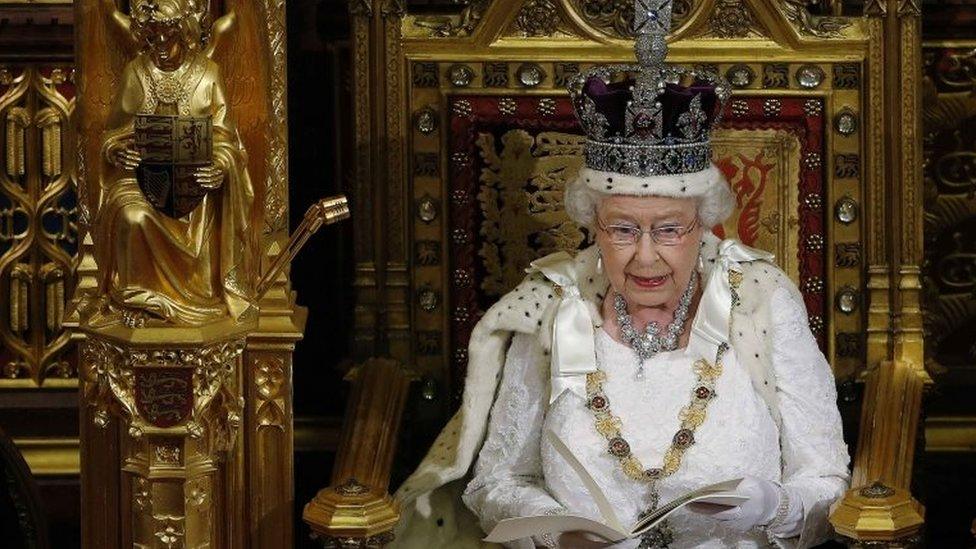
The Queen outlines the government's agenda from the throne in the House of Lords
Forget the fanfares, and focus on the politics.
The new law-making cycle, which begins with this Queen's Speech, will be the last full one before the next general election.
So, from the point of view of the government, the main point of the next 12 to 14 months will be to lay the foundation of the Conservative offer for the next election, which many of the party's MPs now expect in 2023, and shift gear from Covid grimness to sunlit uplands.
This may not be easy, because while some predict a strong economic bounceback, the hangover of the pandemic will be painful for many people and industries, as the first moves to pay off the extra borrowing, the removal of the Universal Credit boost, furlough and the suspension of evictions begin to bite.
Some of the forthcoming legislation might well be designed to deal with those impacts.
But the government may have the space to make the political weather, with its main opponents in England consumed by existential crisis. Labour is bruised by its losses - and the arrival of Hartlepool's new Conservative MP, Jill Mortimer, doubtless to a rapturous reception when she takes her seat, and, perhaps, delivering a pointed maiden speech, will crystallise the doubts of northern Labour MPs contemplating shrivelled majorities.
The Liberal Democrats, six years ago a party of government, have some grounds to feel they're back in the game, and the Greens have a series of local gains to enjoy. But both look a pretty distant threat, given the scale of the Conservatives' triumphs.
Which leaves the SNP. It's claiming an election mandate for a second independence referendum, and the UK government is saying no.
Expect that refusal to feature in the PMs' speech opening the Queen's Speech debate, and some sparky exchanges when Scottish Secretary Alister Jack is before the Scottish Affairs Committee on Thursday. As I write, the chair, the SNP's Pete Wishart, is doubtless honing some acerbic one-liners.
The issue of independence will continue to loom over politics, and there will also be the legacy of Brexit to address - particularly in Northern Ireland.
So what will the government be offering in its new programme? A number of measures have been telegraphed:
Social care
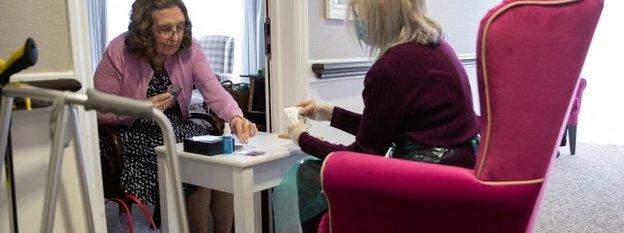
The pandemic has highlighted the need to sort out the social care system, but the massive price tag seems to have pushed this into the long grass, while ministers ponder solutions that go beyond the proposals in the Dilnot review. The commission chaired by the economist Andrew Dilnot proposed a cap on care costs, so that individuals would finance their care up to the cap (in 2011, Dilnot recommended this be set at £35,000), after which the government would pick up the tab, adding a major new spending commitment to the public balance sheet.
Online harms
The key question here is how tough the government is prepared to be on the social media companies, in tackling everything from anonymous online abuse and cybercrime to sites that encourage suicide, self-harm or eating disorders.
Repealing the Fixed-Term Parliaments Act
The government wants to return to the era when a prime minister could go to Buckingham Palace, and ask the sovereign to call a general election, at the moment of their choosing. This would return the electoral cycle to four years or so, rather than the fixed five-year term brought in under the coalition.
The rules around the calling of elections are critical for any democracy, and there are some pretty high-powered issues to revolve around the discretion the monarch could exercise. Again, this is the kind of measure that could produce ping-pong clashes with the House of Lords, but it would give Boris Johnson an enormous tactical advantage.
Northern Ireland veterans
The proposal for some kind of statute of limitations on "legacy" prosecutions looks set to be one of the more controversial and emotive bills of the coming session.
Former Defence Minister Jonny Mercer resigned over the lack of such protection, but some of the Northern Ireland parties and elements in Parliament like the Human Rights Committee and the House of Lords superlawyers may have strong objections. This could produce serious pushback and several rounds of parliamentary ping-pong, with the legislation bouncing between the Lords and Commons for quite a while.
A foreign entities bill
A US-style measure to create a register of people who're working for foreign governments, particularly as lobbyists. A foretaste of the kind of issues this will raise, and the kind of pushback it will encounter, came when the House of Lords brought in new transparency regulations in April, where a number of peers (who serve in an unsalaried house) were worried about the impact of declarations on their income, and insulted at the idea that representing a foreign government in court was somehow tantamount to treachery.
The Lords eventually decided that the need for transparency trumped such reservations, by the way. The bill may also cover treason and espionage, to update the largely pre-internet law on espionage and security, and deal with people joining non-state groups and taking part in conflicts abroad.
Planning reform (England-only)
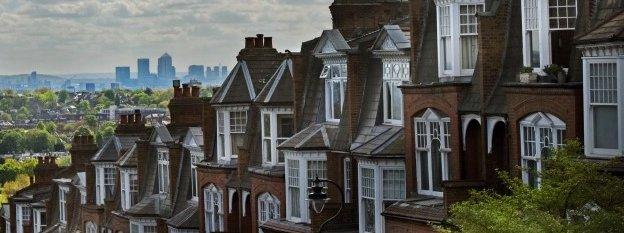
Always radioactive, because any rule change always upsets someone, there are plans for a development-friendly shake up of the system to speed up housebuilding, to meet the Conservative manifesto promise of 300,000 new homes a year.
NHS England reorganisation
Health Secretary Matt Hancock wants the government to take back control and reverse the arm's-length system brought in 10 years ago by his predecessor, Andrew Lansley. It would, for example, mean ministers once more decide over toxic issues like hospital closures. One interesting player in the ensuing debates will be NHS England's soon to be ennobled former chief executive, Sir Simon Stevens.
Sovereign Borders Bill
A Brexit-enabled tightening of immigration rules requiring every foreigner seeking to enter Britain to have a criminal record check, plus automatic deportation for foreigners sentenced to more than six months in prison (it's currently 12 months). This could affect around 1,000 people a year, and, once again, looks likely to face trouble in the Lords.
Other measures
Animal welfare - measures to deal with puppy smuggling, the export of live animals for slaughter, trophy hunting and other issues; an Environment Bill focused on protecting ecological diversity, a prisons/rehabilitation measure, focusing on non-custodial measures to deal with crime.
The expected Building Safety Bill is another candidate for extended ping-pong, reprising the long row between Lords and Commons over who should pay for post-Grenfell fire safety improvements, during the passage of the Fire Safety Bill.
There will doubtless be plenty more - the advance leaks of the contents of the speech (now as traditional a part of a state opening as the Cap of Maintenance) suggested 20-plus bills would be proposed.
Here's my rundown of a significant, but slimmed-down week ahead in Westminster:
Tuesday 11 May
The ceremonial side of State Opening begins (11:15) with the arrival of the sovereign, the slamming of the door in Black Rod's face as she delivers the summons to MPs to attend Her Majesty in the House of Lords, and the reading of the list of legislation the government plans to bring forward.
MPs then return to their socially distanced chamber, where the new member for Hartlepool will enjoy the first socially distanced introduction of a new MP, probably before the main debate begins. There are also some rituals to perform - Mr Speaker has a homily on privilege and responsibility to deliver. And there's also the traditional first reading of the Outlawries Bill, an ancient ritual symbolising the Commons' right to attend to its own priorities before debating the Queen's Speech.
Then comes the debate on a humble address to the Monarch thanking them for the speech - opened by a couple of backbenchers, classically described by Conservative ex-minister Andrew Mitchell as "an old stager on the way out" and "an oily young man on the make".
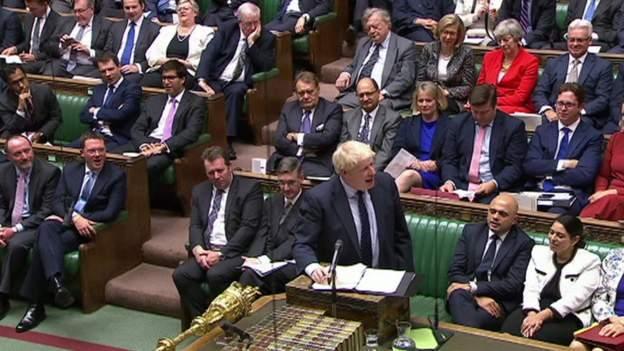
Boris Johnson delivered the Queen's Speech in October 2019
I don't know the names yet - traditionally, they get a call from Downing Street a couple if days before they are called on to perform. The trick is to combine humour with some politics while not lapsing into over-earnestness, and, in normal times, the House can become restive if the speech bores MPs - but with just 50 allowed on the green benches, a bellyflop could be excruciating.
In normal times, a week's break would frequently mean a couple of ministerial statements to update parliament on urgent issues, but as the parliamentary procedure guide, Erskine May, notes, "there is no precedent" for a statement on the day of the Queen's Speech. If there were important developments, the prime minister could address them in his speech - which is supposed to range across government policy. So any pandemic developments or fisheries skirmishes could be covered then.
The PM opens the multi-day debate on the speech proper, then the leader of the opposition, Sir Keir Starmer - and then by appropriate cabinet ministers and their shadows, on the subsequent days, which focus on particular subject areas. There will be votes on amendments from Labour (as the official opposition) on the penultimate day and the final day.
And on the final day the Speaker can select two further amendments for votes (Standing Order No 33, since you ask). They're usually from the second largest opposition party and sometimes from some cross-party alliance or from government backbenchers. These are framed as additional words (up to 250) to the humble address, in respectful terms of regret about the contents of (or what is missing from) the government's programme.
The can be highly significant. Back in 2013, John Bercow's decision to allow an amendment from Tory Brexiteers (as they were not then called) regretting the lack of a bill for an EU referendum, arguably began the political march towards the 2016 Referendum and Brexit. More recently, Labour's Stella Creasy successfully tabled an amendment in 2017, about access to abortion for women in Northern Ireland, which resulted in a pre-emptive change of policy by the government.
This time around there are backbench alliances on a variety of issues - assisted dying, a public interest defence for whistleblowers who reveal official secrets, overseas aid, and anti-money-laundering measures. The Speaker does not have to select such amendments, but if he's offered several to choose from, it could make for an interesting decision.
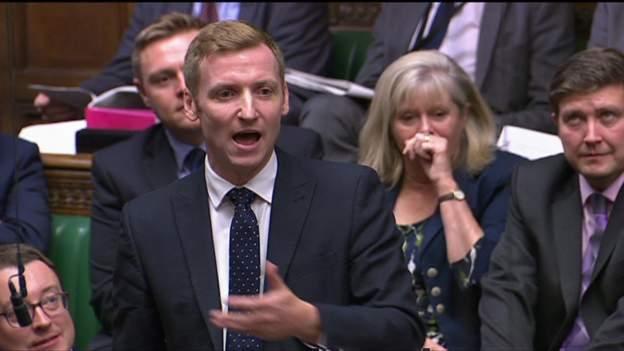
Tory Lee Rowley was one of the MPs called on to open the debate on the Queen's Speech in 2019
The day ends with an adjournment debate, led by Conservative Sir David Amess, on the case for a national memorial for Dame Vera Lynn.
Slightly surprisingly, there's a smattering of committee action in the afternoon: most attention is likely to focus on the Treasury hearing (16:00) on lessons from Greensill Capital, with the man himself, Alexander Greensill.
Defence (14:30) has what promises to be a pretty interesting session on the responsibilities of the minister for defence people and veterans with Johnny Mercer, who resigned from that position in April, accusing the government of failing to live up to its promises to veterans.
What will he have to say about the promised new bill to protect Northern Ireland veterans from prosecution over historic allegations? He said there was no sign of such a bill when he quit - yet now it is being promised. Committee chair Tobias Ellwood has previous held the same job, so bring popcorn.
Home Affairs (16:00) looks at the policing of the Clapham Common vigil and the protests which followed the killing of Sarah Everard, with the Met Police Commissioner Cressida Dick.
Environment, Food and Rural Affairs (14:30) looks at environmental land management and the agricultural transition, with witnesses from the National Farmers' Union, the Tenant Farmers Association, the Country Land and Business Association, plus the National Sheep Association and the National Beef Association.
In the Lords, the debate on the Queen's Speech opens at 16:00 with speeches to move and second their humble address of thanks to the sovereign.
Wednesday 12 May
The Commons opens (11:30) for day two of the Queen's Speech debate.
The day's committee action sees Home Affairs (10:00) quiz the minister for crime and policing, Kit Malthouse, about police conduct and complaints and the impact of recent reforms in improving the speed of complaint handling and public confidence in the system.
Work and Pensions (09:30) takes evidence on children in poverty, with witnesses from local government and charities; Transport (09:30) has one of its regular progress-checking sessions on major transport infrastructure projects.
And Northern Ireland (15:00) hears from ministers Kevin Foster (Home Office) and Robin Walker (Northern Ireland) about citizenship and passport processes in Northern Ireland.
In the Lords (12:00) it's day one of the Queen's Speech debate, focusing on the economy, business, health and education. Their lordships may provide the most serious legislative obstacle to the new government programme - so ministers should keep an eye on what is said, particularly from the swing voters, the crossbench - or independent - peers.
And look out for the maiden speech of one of the prime minister's most controversial appointments to the Upper House - Lord Lebedev, the owner of the Independent and the Evening Standard, who sits as a crossbench peer. He's expected to speak remotely, and he will talk about what it means to be a Russian elevated to the House of Lords.
Thursday 13 May
The Commons opens (09:30) for day three of its Queen's Speech debate - and proceedings will end with an adjournment debate on the Levelling Up Fund and regeneration of Rother Valley's high streets, led by Conservative Alexander Stafford - rather apposite given the previous week's events.
Committee action includes some pretty significant hearings. Treasury (14:30) continues its look at the lessons from Greensill Capital, with evidence from former Prime Minister David Cameron.
On a related theme, Public Administration (10:00) has a post-appointment hearing with the prime minister's new Independent Adviser on Ministers' Interests, Lord Geidt.
And watch out for Scottish Affairs (11:30) hearing with the Scotland Secretary Alister Jack, where SNP veteran and committee chair Pete Wishart will lead the questioning. I imagine the word referendum might come up.
Public Accounts (10:00) takes evidence on the costs of the English rail system, which, having navigated the fiendish complexities of the system, the National Audit Office estimates to amount to a subsidy of £3.67 per passenger journey. And Housing, Communities and Local Government (15:30) looks at how to revive high streets after Covid-19.
In the Lords (12:00) day two of the Queen's Speech debate focuses on the constitution and the Union. Note that the SNP has never taken up seats in the Lords - so its voice will only be relayed by sympathetic peers from other parties or none. There's also a maiden speech from one of the new Labour arrivals - Baroness Merron, the former minister Gillian Merron.
Neither House is expected to sit on Friday 14 May.
